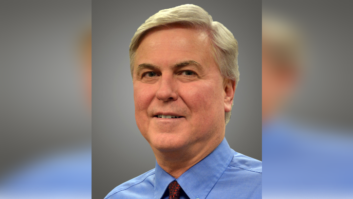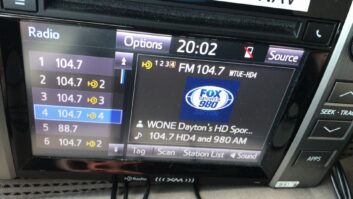In Russell’s Point, Ohio, the population of 1,530 more than doubles during tourist season. Situated on scenic Indian Lake, the village home to the annual Eagles Crappie Tournament, a maple syrup festival and daffodils popping up every spring. (Each of these events qualifies as “tourist season.”)
Russell’s Point also is home to WRPO(LP), an oldies-spinning, community-servicing 100-watt operation heard on 93.5 MHz, licensed to the city itself and run since its inception by Gray Fox Broadcasting. WRPO signed on Memorial Day weekend, 2002. It is about to turn 10.

Gene Kirby wiring new studio B.
Everyone involved with the station is a volunteer, even General Manager Gene Kirby, the gray fox of the company’s name (and not to be confused with the late, famous American sportscaster). He splits his time between WRPO(LP) and a part-time job as director of operations at WQTT(AM) in Marysville.
‘Community Minute’
“I have a place up there in Russell’s Point that we use during the summer,” he says. “Since I’ve been in radio for 50 years, starting this station seemed like a good thing to do, so we approached the town council.”
WRPO began as a hobby for Kirby. He says that after retiring from General Electric Mobile 16 years ago, “I wanted to get back into broadcasting. You never get enough of radio because once you get the bug, it’s hard to get rid of.”
Program Director Kevin Fodor noted that two years ago the station asked a local church to undertake a phone survey of 100 area residents, asking about their music preference; 60 percent said “oldies.” Thus the format was switched from smooth jazz to hits of the 1950s through the 1980s.
“Hey, if you can get a consensus from two out of 10 citizens, that’s excellent,” said Fodor. “If you’re getting this strong a message, you should go with it. We play the standard 600 oldies but we also have another 600 in our ‘B’ category.”
Unlike many low-power operations, the station features local news and weather, as well as a “Community Minute” segment aimed at born-and-bred Russell’s Pointers and enthusiastic newcomers alike. Because the local police and government offices are in the same building as the station, the latest news is easy to come by.
On the weekend, you can tune in to shows devoted to the Beatles, bluegrass music and local church services. “Debbie the Lunch Lady,” a real-life food service employee at Indian Lake Schools, presents the daily K–12 lunch menus.

Dale Madison on air, studio A.
One surprising feature of WRPO is a mini-broadcast museum, situated in the hallway. “Some of the equipment is on loan from our GM,” said Fodor, who uses the on-air moniker Jason Michaels.
“We have old TV cameras and radio tubes along with a Collins console that looks like it’s circa 1968,” Fodor said. “What I hate are those stations where it’s nothing but one guy running it with his iPod.”
Arbitron, Schmarbitron
Like Kirby, Fodor has a full-time job elsewhere in broadcasting, at Cox Media’s group of stations in Dayton. He knows it’s important for WRPO to pay attention to listener response.
“I was sitting in a local watering hole and a lady there spoke up when I mentioned the station and told me she loved our Beatles show, without any prompting from me,” he said, adding that the number of underwriters the station employs has grown from 12 to 50 since they started their oldies format.
Fodor said the station gets lots of emails and letters from regular listeners, complimenting the station on its technical quality (engineering by Kirby and production by Fodor).
“Last year we purchased a digital audio processor known as Breakaway Broadcast by Claesson-Edwards, and it caused an immediate improvement to our sound over the old 1980s-vintage analog processor that the station had for years,” he says. “While we do play MP3s for our music, we only play 320 kilobyte files.”
Perhaps it’s respect from the community that has led to the cash donations totaling “four figures in the past, which is not bad given the size of our community,” Fodor said.
And the FCC says
The LPFM service is about to expand, as RW has reported.
According to a recent FCC report to Congress prepared as part of that process, typical LPFMs have “negligible ratings by all available measures,” yet tend to attract loyal listening as evidenced by high time spent listening.

Dale Madison doing a remote broadcast at Indian Lake.
Because the service itself has existed only for a dozen years or so, not much documentation exists about them. Therefore, the commission also undertook a small study of eight LPFM broadcasters as part of its report. In the end, it determined that “none of the sample stations stated that maximizing revenues or listenership is among their goals.”
The survey also determined that most LPFMs work within a budget of between $5,000 and $15,000 annually.
This is certainly true of WRPO, which operates out of space provided by the village of Russell’s Point. The village also supplies Internet service so the station can be programmed remotely. This facilitates emergency weather updates from wherever station personnel might be. WRPO’s annual budget of less than $7,000 is barely enough to pay the music licensing fees and keep the lights and phone operating.
“It’s a challenge,” said Fodor, simply.
‘A break-even thing’
Full-power broadcasters over the years have expressed concerns about possible interference from LPFMs, usually their concerns took the form of NAB opposition to its expansion.
In 2007, the association stated in a press release, “The 232 million weekly listeners of local radio should not be inundated with the inevitable interference that would result from shoehorning more stations onto an already overcrowded radio dial.”
But when a compromise to expand the service became law, NAB expressed satisfaction that the legislation had confirmed the primary status of full-power stations and provided spacing rules to protect stations.
Kirby believes interference is not an issue in Russell’s Point.
“We have never had a problem with that because we operate under the guidelines of the FCC and watch our ERP output. We are well-liked by other local broadcasters and try to keep them happy,” he said.
“I wish we could use a translator, as I know of some other LPFMs that use them and they help a lot. I also wish we could use an FM booster station, but that is not an option for us since we are allowed only one station license.”
Kirby does not see WRPO as competition for the local commercial broadcasters with respect to programming either: “This is a break-even thing. We don’t make money, nor do we want to. We’re here for the people with our music, school menus and events calendars. It’s strictly a little community station.”
Ken Deutsch is from a small town in Ohio where he confesses that he once stole a comic book from a drug store. Since this occurred 50 years ago, he is hoping the statute of limitations is up.












